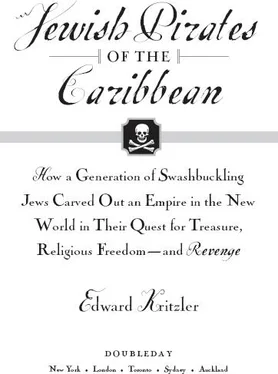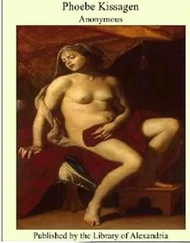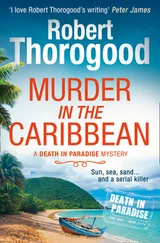Edward Kritzler - Jewish Pirates of the Caribbean
Здесь есть возможность читать онлайн «Edward Kritzler - Jewish Pirates of the Caribbean» весь текст электронной книги совершенно бесплатно (целиком полную версию без сокращений). В некоторых случаях можно слушать аудио, скачать через торрент в формате fb2 и присутствует краткое содержание. Год выпуска: 2008, ISBN: 2008, Издательство: Knopf Doubleday Publishing Group, Жанр: Старинная литература, на английском языке. Описание произведения, (предисловие) а так же отзывы посетителей доступны на портале библиотеки ЛибКат.
- Название:Jewish Pirates of the Caribbean
- Автор:
- Издательство:Knopf Doubleday Publishing Group
- Жанр:
- Год:2008
- ISBN:9780385528368
- Рейтинг книги:3 / 5. Голосов: 1
-
Избранное:Добавить в избранное
- Отзывы:
-
Ваша оценка:
- 60
- 1
- 2
- 3
- 4
- 5
Jewish Pirates of the Caribbean: краткое содержание, описание и аннотация
Предлагаем к чтению аннотацию, описание, краткое содержание или предисловие (зависит от того, что написал сам автор книги «Jewish Pirates of the Caribbean»). Если вы не нашли необходимую информацию о книге — напишите в комментариях, мы постараемся отыскать её.
Jewish Pirates of the Caribbean — читать онлайн бесплатно полную книгу (весь текст) целиком
Ниже представлен текст книги, разбитый по страницам. Система сохранения места последней прочитанной страницы, позволяет с удобством читать онлайн бесплатно книгу «Jewish Pirates of the Caribbean», без необходимости каждый раз заново искать на чём Вы остановились. Поставьте закладку, и сможете в любой момент перейти на страницу, на которой закончили чтение.
Интервал:
Закладка:
Whether or not such a scene took place, Ferdinand finally relented: Columbus would sail with his right to rule any new lands he discovered, to be “enjoyed forever by his heirs and successors.” 7
After Columbus returned from his successful first voyage, he made three more trips across the Western Sea. He never reached Asia, and didn’t live long enough to fulfill his pledge to Santangel and the court Jews to provide a homeland for converted Jews. But it would be kept by his family in the “new land” the Crown did bequeath to Columbus’s descendants, the island of Jamaica. How this came about goes back to a promise he made to the teenage conversos who stood by him when he was marooned there.
Returning from his fourth voyage to the New World, Columbus had been forced to beach his ships in Jamaica after sailing from Panama with a cache of gold objects bartered from the Indians. His two ships were leaking badly. Columbus hoped to reach Santo Domingo to obtain others to return to Spain. But his worm-eaten caravels, described by his son as “more full of holes than a bees’ honeycomb,” barely made Jamaica. With water rising in their holds, he ran them aground and lashed them together in a shallow, becalmed bay on the island’s north coast, “a cross bow’s shot from land.” 8Atop his foredeck he fashioned a palm thatch hut to serve as his cabin.
In his first letter to the queen, written soon after he arrived, he bragged that he had discovered the source of Solomon’s gold in the mines of Panama, and claimed to have seen more gold in a few days there than in all his previous trips. His fourteen-year-old son Fernando, brought along as cabin boy, later recorded that his father had traded small bells and mirrors for sixty-three gold pendants and other gold objects with the Veragua Indians of Panama. 9
This was his second trip to Jamaica. When he had discovered the island in 1494, he had named the half-moon bay where he was now stranded Santa Gloria for “the beauty of its glorious landscape.” 10After a year, he thought he might never leave. Was this where his life was to end? Uncertain of his future, he wrote his queen:
We have been confined 10 months, lodged on the decks of our ships. My men have mutinied. My brother, my son, and those that are faithful are sick, starving and dying. Governor Ovando of Santo Domingo has sent to see if I am dead rather than to carry me back alive. I conclude Your officers intend my life should terminate here. 11
The object of his cynicism was the arrival the previous week of a ship from Ovando. It had anchored outside the reef in the late afternoon, and left before dawn. Before sailing away, its captain ferried over a side of ham, a barrel of wine, and a message from the governor that a rescue ship would soon be sent.
The governor’s message did confirm the safe arrival of Columbus’s first mate, Diego Méndez, who ten months before had set forth in a dugout canoe to carry news of their plight to Santo Domingo. But, as he wrote the queen, he really believed the ship had been sent “to spy on how I might be totally destroyed.” 12
Made furious by his suspicions, Columbus concluded his letter with an angry vow. Should he die in Jamaica, and his proprietary rights be withdrawn, “ingratitude will bring down the wrath of Heaven, so that the wealth that I have discovered shall be the means of stirring up all mankind to revenge, and the Spanish nation shall suffer hereafter.” 13
Fortunately for Columbus, Isabella never received his threat. Having no way to send this letter, Columbus could only call on “the good angels that succor the oppressed and innocent to bring this paper to my great mistress.” 14Apparently no Heavenly couriers were listening as this little known letter never left the island. His earlier letter, carried by Méndez, had been forwarded to her from Santo Domingo.
The mutiny referred to in his despairing missive had broken out five months earlier, when Francisco Poras, captain of one of the ships, burst in on the admiral in his straw cabin and demanded they leave at once. He and his brother Diego, the fleet’s notary, accused Columbus of having deliberately marooned them in Jamaica knowing he was unwelcome in Santo Domingo. The Poras brothers’ insurrection was joined by most of the older seamen, who after six months in Santa Gloria wanted out. Columbus declared he would not leave, but rather than battle the mutineers, agreed to let them go.
Crying, “I am for Castile—follow me,” the rebel leader seized the dozen canoes Columbus had bartered from the Indians. Forcing the natives to row, the rebels made three attempts to overcome the fierce currents of the 108-mile-wide channel to Hispaniola. On their final try, they gave up, though only after throwing eighteen Indian paddlers overboard, and chopping off the hands of those who clung to the side. Five months later, after a two-week march across the island, marked by rape and pillage, they were encamped in an Indian village a half mile from Santa Gloria, intending to seize the admiral’s ships.
Columbus had just finished his troubled letter to the queen when the two men he had sent to parlay with the rebels returned. They had taken an offer of pardon and a promise that they would soon be rescued. But Poras rebuffed them.
When his emissaries reported that Poras’s men were preparing for battle, Columbus withdrew to his cabin in despair. But Bartholomew, his fierce younger brother, convinced him to take the fight to the enemy. He armed the fifty young loyalists and set forth to attack the rebel camp. When the mutineers saw Columbus’s teenage army approach they laughed. There was no way mere youths, “brought up in a softer mode of life,” could defeat such “hardy sailors, rendered robust and vigorous by the roving life.” 15But the rebels’ confidence was premature: In a superhuman effort, Bartholomew slew the six mutineers sent to attack him, and had the point of his sword at Poras’s breast when the rest surrendered. The Poras brothers were put in irons aboard ship, and the forty-eight rebels were disarmed and kept on shore. With peace restored, a reunited, mistrustful crew nervously awaited their promised rescue.
Even if Ovando did send a ship, Columbus had little faith his gold medallions would be safe in Hispaniola, whose previous governor, he wrote the queen, “robbed me and my brother of our dearly purchased gold.” 16He expected no less from Ovando. During the tense five weeks before two rescue ships arrived (one sent by Méndez, the other by Ovando), he rarely left his cabin. Never again did he set foot on Jamaica.
What happened to the gold of Veragua? The Crown had instructed Columbus that if treasure was found, “you must draw up an account of all this in the presence of Our Notary…so that We may know everything that the said Islands and Mainland may contain.” 17Yet the sixty-three medallions from Panama are not mentioned in the notary’s account, nor are they listed in the inventory of the ship that brought him home to Spain. 18Unsure his gold would survive Ovando’s rescue, Columbus would not have left the gold in Hispaniola. 19Columbus also had reason to fear a renewed mutiny on the way back to Spain. It is therefore unlikely that he kept the gold with him.
That leaves Jamaica. Since he never left the ship, and trusted no one but his son and brother and a core group of loyalists, he presumably asked members of this latter group to transfer his gold to safety.
There were two good reasons he could count on these youths, whose unstinting loyalty he vowed to reward. 20First, they had a fiscal interest in the voyage, as their fathers helped finance it. Second, their families, being wealthy conversos, were targeted by the Inquisition. It is reasonable, therefore, to postulate that to keep their sons safe, Columbus’s backers persuaded him to take them along.
Читать дальшеИнтервал:
Закладка:
Похожие книги на «Jewish Pirates of the Caribbean»
Представляем Вашему вниманию похожие книги на «Jewish Pirates of the Caribbean» списком для выбора. Мы отобрали схожую по названию и смыслу литературу в надежде предоставить читателям больше вариантов отыскать новые, интересные, ещё непрочитанные произведения.
Обсуждение, отзывы о книге «Jewish Pirates of the Caribbean» и просто собственные мнения читателей. Оставьте ваши комментарии, напишите, что Вы думаете о произведении, его смысле или главных героях. Укажите что конкретно понравилось, а что нет, и почему Вы так считаете.












